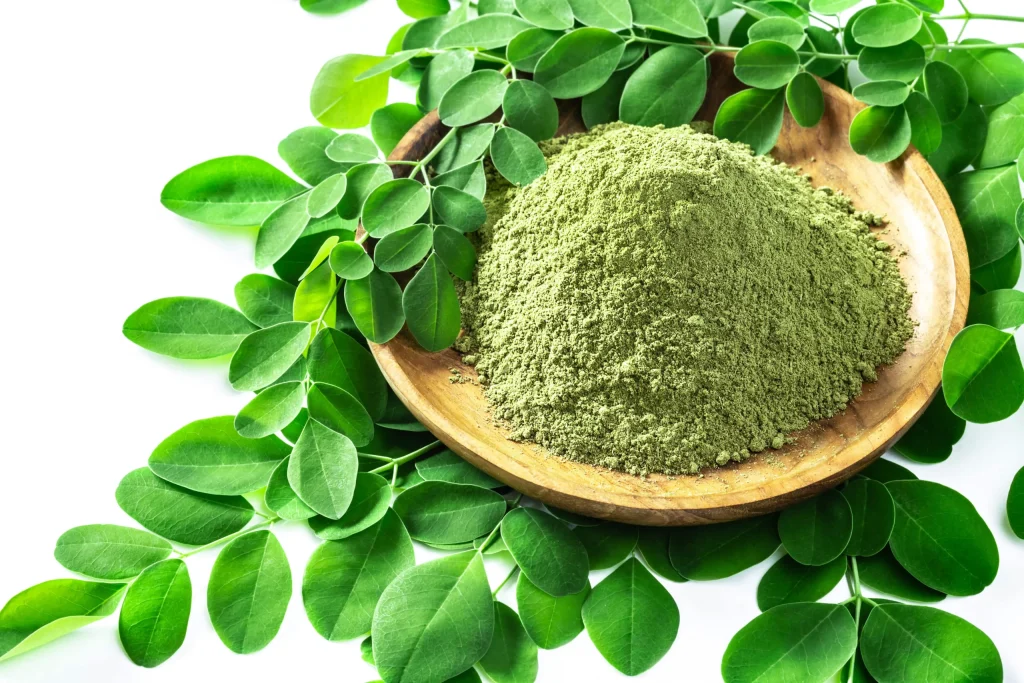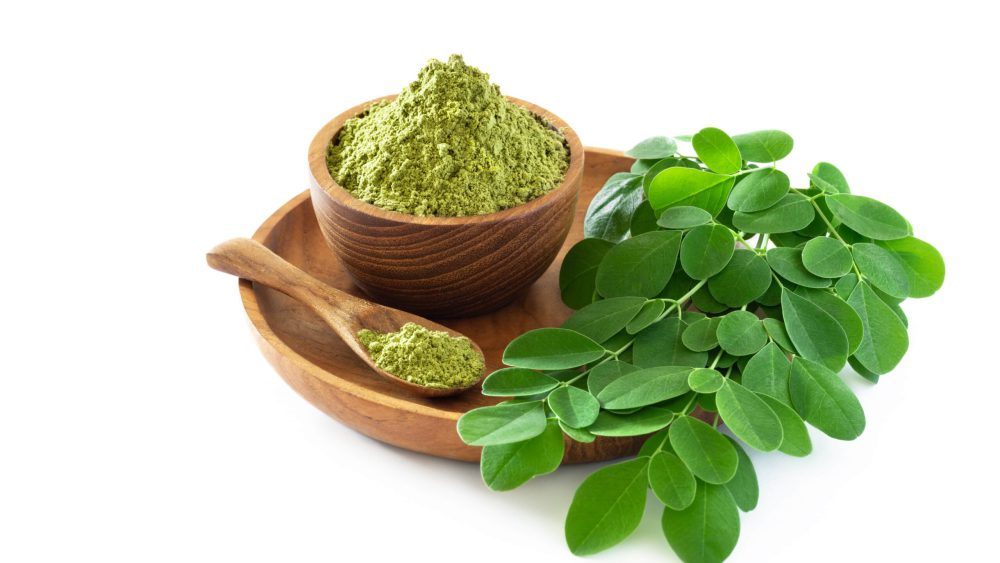Healthcare is getting a heck of a lot more expensive in the U.S. Alternative medicine used to be for quacks. But with the cost of healthcare steadily rising, some of us don’t have many more options.
A lot of us are realizing that natural remedies can be surprisingly effective. For example, many everyday ailments can be effectively treated with honey. But no other single remedy in the world can compete with the moringa plant.
I want to share with you 10 moringa health benefits that may be able to save you an unnecessary trip to the doctor’s. (And your wallet. And your sanity.)
What is Moringa?
The moringa tree, also known by scientists as moringa oleifera and by enthusiasts as the “Tree of Life,” is a plant native to the Indian subcontinent.
But this tree is different than most. The entire moringa tree, from the seeds to the leaves, has been used by cultures around the world for thousands of years for medicinal purposes.
There are written accounts of the ancient Romans, Egyptians, and Greeks using moringa for various ailments. Oral tradition in Africa mentions moringa use for treating symptoms of diabetes. Moringa has been a staple in Ayurvedic medicine for centuries and is still used today. Technology may have advanced by light years since then, but the mythology and wonder surrounding the moringa tree lives on.
If you’ve heard anything about moringa already, you probably heard the spectacular claim that a serving of moringa leaves has more vitamin A than carrots, more calcium than milk, more iron than spinach, more vitamin C than oranges, more potassium than bananas, and almost as much protein as eggs.
No, you weren’t misinformed. It’s true. And what’s even more unbelievable — they’re being used to combat world hunger. Moringa is so nutritious that it’s the food of choice for those with little food. And it can even continue to thrive for a while during a drought.
No wonder they call moringa the “Tree of Life!”
Parts of the Moringa Plant and How They’re Used
Unlike many of the plants we use, the entire moringa plant can be used for our benefit — even the roots!
Each part of the moringa plant has different uses:
Moringa Flower
These pretty white flowers are great for moringa tea! But the moringa flower isn’t just beautiful (and tasty!) — it has plenty of medicinal benefits.
Using the flower is a popular way to reap the many moringa tea benefits. In fact, people in Southwest Asia use moringa flowers to make tea that can strengthen immune health and alleviate symptoms of PMS. The flowers are also added raw to meals for a boost of nutrition — they’re full of calcium and potassium. But be careful not to eat too much – moringa flowers make you need to use the bathroom!
Moringa Leaf
This is the most commonly used part of the plant. The benefits of moringa leaf comes from both the leaves themselves and the juice inside them.
Moringa powder — its most convenient form — comes from the leaf. The leaves are noted for their nutritional value. They lose nutrition as they get older, so moringa leaves are best used when they’re young.
Moringa leaves are known to be antiviral, antibacterial, and antifungal. Some studies show promise in using moringa leaves to prevent and treat cancer in the future.
Moringa Pods
The fruit of the moringa tree — it has to be super good for you, right?
The complex plant compounds in moringa pods are so potent that they’ve been used medicinally throughout history. Even to this day! Today, the pods of this traditional Ayurvedic herb are invaluable to modern medicine for being an inexpensive source of activated carbon to treat poison ingestion. So yes – it is that good for you.
Moringa pods are known for being antimicrobial, making them effective at killing minor infections. Their high antioxidant content makes them great for the immune system. The oil inside the pod is anti-inflammatory and is often used to treat ailments like arthritis.
Moringa pods are also great for regulating the digestive system, especially if you have Irritable Bowel Syndrome. It’s good for alleviating diarrhea, too. All of those benefits, plus it can be a tasty addition to a meal. It’s almost too good to be true.
Moringa Root
Moringa roots are incredibly potent and have more nutrients than its more popular leaves and seeds. (But be careful — moringa root has toxins that can paralyze your nervous system if you eat too much of it.
It’s better to consume this as a medicine, not a snack.)
Moringa roots are unique for their antibiotic properties. In traditional medicine, moringa root is used to treat chronic conditions like asthma, arthritis, and gastritis.
Moringa Seeds
Eat ‘em, crush ‘em, make ‘em into an oil. No matter how you use them, moringa seeds will benefit you in some way.
You may be wondering — how can seeds have such great medicinal value? Well, moringa seeds are equipped with a powerhouse antibiotic called pterygospermin.
Effective at killing infections like staph and the antibiotic-resistant P. aeruginosa, this ancient folk remedy still has a firm place in modern medicine. Moringa seeds are also known for their anti-inflammatory benefits. Combine that with their antibiotic properties, and you have a formidable treatment for STDs, cystic acne, and much more.

Moringa Risks
For all its benefits and lack of side effects, there are a few precautions to take before ingesting any part of the moringa plant. Seriously, you’ll want to read this first.
Avoid moringa if you’re pregnant. It’s suspected that moringa can induce miscarriages. Moringa roots are even used as long-term contraception in some rural parts of India. It’s believed to cause the reproductive system to temporarily shut down, but it hasn’t been proven in a lab.
Better to be safe than sorry.
It’s also possible to overdose on moringa. But don’t freak out — 3 or 4 times the recommended dosage is what you need to consume to overdose. Always follow the recommended dosage.
Practical Medicinal Benefits of Moringa
Because moringa has been used for its health benefits for many civilizations throughout history, there are a lot of claims about how moringa is good for this or that. What’s the bottom line?
Some of those claims have been backed up by scientific studies. Some haven’t. (And some can’t be proven or disproven, because it hasn’t been studied well enough yet.)
See for yourself what medicinal benefits moringa may have in store for you!
Moringa Lowers Cholesterol
So get ready to stock your kitchen with moringa for future salads. Why?
Like most dark, leafy greens, moringa leaves are fantastic at lowering “bad” cholesterol (LDL) and raising “good” cholesterol (HDL). Studies have shown that moringa can help lower the LDL levels in the kidney, liver, AND blood. Even when your diet is otherwise high in fat.
Moringa Purifies Water
We take our water a lot more seriously than we used to. We need clean water to live, but not everyone has access to it.
Scientists and environmentalists have a few ideas on solving the clean water crisis. One of them is moringa. Thanks to their antibacterial and antiviral properties, moringa seeds can actually remove 90% or more of harmful bacteria in dirty water!
This is how it works: You pour the moringa into the water (1 gram of moringa powder for every 10 liters of water). Naturally, the dirt, debris, and bacteria will sink to the bottom. After sitting for an hour, the water can be strained and boiled — it’s safe and ready to use!
Moringa Relieves Nutrition Deficiency
Moringa’s ability to quickly replenish lost nutrients has made it an important crop worldwide. When there’s a drought or food crisis, moringa is used to help prevent people from becoming malnourished.
If moringa is being used to feed the undernourished, it must be pretty special, huh? Well, get this: Moringa has all nine essential amino acids and is full of more nutrients than superfoods like kale!
For example, 100g of moringa leaves have more than double the amount of protein, fifteen times the glutamic acid, and six times the lysine than 100g of kale! WOW! Moringa is also high in manganese, zinc, copper, selenium, iron, magnesium, calcium, and vitamins A, B2, B6, and C.
The high nutritional benefits of moringa makes it perfect for those who can lose nutrients rapidly — like people with IBS and anemia.
Moringa Regulates Blood Sugar
Did you know that moringa leaves are used as a natural treatment for diabetes in rural villages around the world? From India to Sudan, the villagers use the plant’s leaves to stabilize blood sugar.
And they’re absolutely ahead of the game. Scientific studies have shown that moringa is pretty effective at balancing blood sugar levels.
Consuming moringa leaves after a meal can reduce sugar levels by up to one-fifth. If eaten regularly, blood sugar can be lowered by nearly a third!
But why is moringa so good at regulating blood glucose? It’s all thanks to the isothiocyanates, quercetin, and chlorogenic acid found in moringa leaves.
Chlorogenic acid and quercetin are both antioxidants that are known for being hypotensive. (Chlorogenic acid is also present in coffee, but it tends to break down and lose nutritional value when heated.) And isothiocyanates are a phytochemical, or a chemical found only in plants. Isothiocyanates are also great at lowering blood glucose.
Cool to know if you have hypoglycemia or diabetes!
Moringa Promotes Healthy, Youthful-Looking Skin
Moringa is an absolute lifesaver when it comes to your skin. For one, moringa’s antibacterial and antifungal properties make it excellent for preventing and treating infections. It’s safe to put on wounds, infections, the scalp, and anywhere else you may need it.
Moringa won’t sting your cuts and scrapes, even if they’re still fresh. Great for after a trip with the kids to the park. Also, moringa has excellent inflammatory benefits which can reduce redness from acne and rosacea.
Moringa is also good at locking moisture into your skin. Plus, it’s full to the brim with antioxidants, making it great for anti-aging.
Dealing with adult acne? Moringa can diminish redness and prevent infection. The antioxidants are also effective at neutralizing free radicals on the skin. As you may already know, free radicals contribute to premature aging.

Moringa Improves Liver Health
Moringa (particular moringa oil and juice from the leaves) is surprisingly effective at healing and protecting the liver. That’s right — it maintains AND repairs.
Moringa rids our livers of the body of the heavy metal toxins that saturate our environment, thanks to its hefty serving of antioxidants. That’s so relieving to know — especially because the liver is in charge of regulating oxidative stress in other organs and filtering everything that passes through the body.
A study even shows that moringa may even be able to protect the liver from hepatitis. But what about if your liver isn’t doing so well?
An overworked liver will have fewer enzymes, causing it to have to work even harder. When ingested, moringa helps to revive the liver enzymes that help it function correctly. An inflamed liver from a poor diet or chronic alcohol use can also be treated by moringa.
Remember — the liver filters everything that enters our body. So when it has to work twice as hard to process the bad things you’re ingesting, it becomes inflamed. As a result, it doesn’t function exactly how it should.
Lucky moringa is a superb anti-inflammatory agent, huh?
Moringa is Anti-Inflammatory
Inflammation is responsible for many of the chronic conditions we suffer from. Like cancer.
Cardiovascular disease. Irritable Bowel Syndrome. Liver damage. Rosacea. All caused by inflammation. So if you have problems with inflammation, you’re in luck. Moringa has strong anti-inflammatory properties.
Moringa seeds, pods, and leaves are best for inflammation. These parts of the plant have the most isothiocyanate, which is believed to play a role in reducing inflammation.
Moringa Helps Produce Breast Milk
Many mothers, especially first-timers, know the struggle of breastfeeding. Plenty decide not to
breastfeed just to avoid the inevitable (and painful) complications, like chapped nipples or a blocked milk duct. But how many would change their mind if they got a little help from a moringa plant?
Farmers all around the world give moringa to their nursing animals. Why? It helps them produce more milk! In fact, studies have shown that moringa can increase breast milk production by up to 176%! Moringa is also high in iron, which is great for both mom and child.
Just be careful not to eat moringa while you’re actually pregnant. It is believed to cause miscarriages, though more research needs to be done.
Moringa Improves Lung Function
No one wants a pair of smoker’s lungs. Not even a smoker.
Luckily, some studies show that moringa may have some promise when it comes to improving lung function. Its anti-inflammatory effect has proven to be so effective, moringa can treat bronchitis!
Moringa Relieves Asthma Symptoms
Yup, you heard right.
A study on the effects of moringa seeds on asthma has shown that it can effectively reduce asthma symptoms and the intensity of an attack. Even better, the study didn’t observe any side effects.
By the way, I’m not saying to ditch the asthma pump. But milder asthma is still a small win.
What is Moringa Good For? The Bottom Line
- Making dirty water potable
- Lowering blood sugar
- Increasing milk production in nursing mammals
- Improving lung function
- Alleviating arthritis swelling and pain
- Fighting infections
- Clearing up acne and redness
- Lowers cholesterol
- Improves function of the immune and digestive system
- Combating malnourishment
- Killing bacteria
Want More Beauty & Wellness on Your Social Media Feed?
Follow me on Instagram @JustAskDavid for more natural remedies, DIY beauty, beauty industry secrets, and more!





Comments are closed.